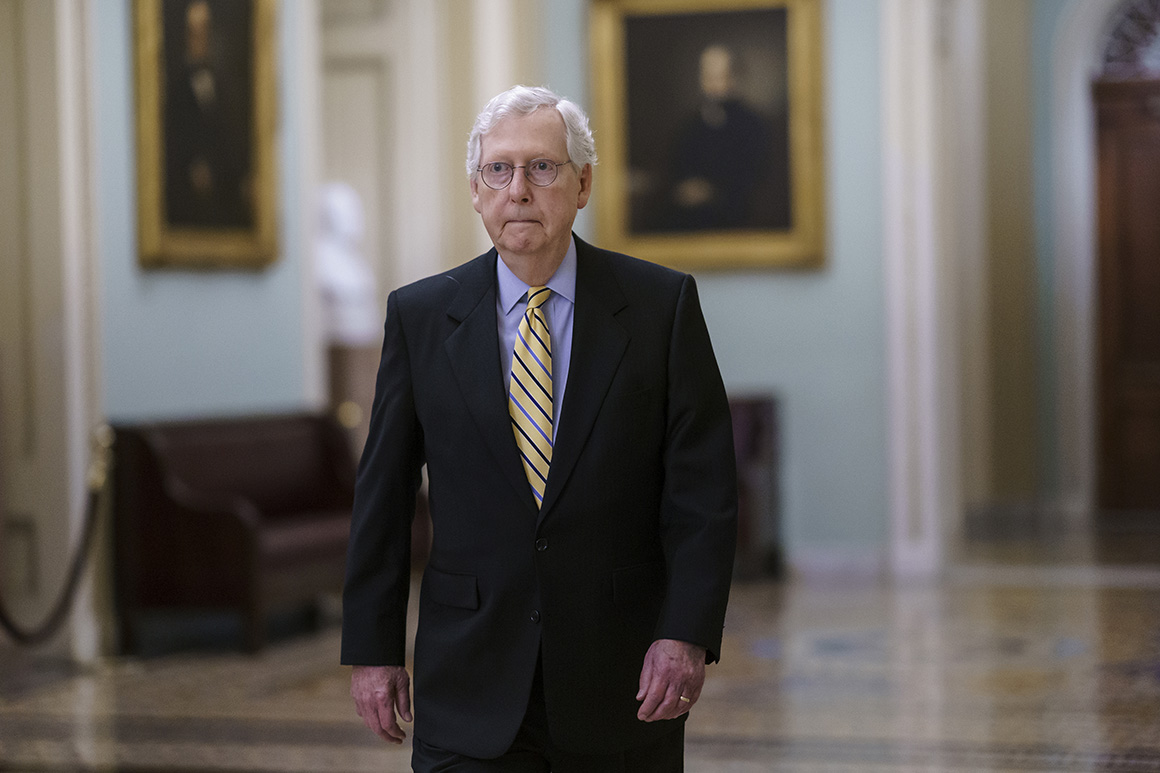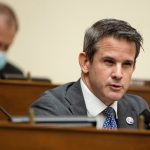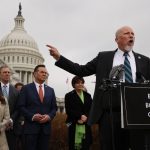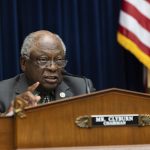Mitch McConnell is pressuring President Joe Biden and congressional Democratic leaders to further weaken the link between a bipartisan infrastructure deal and a bigger liberal-leaning spending bill, warning Monday that Biden’s party wants to "hold a bipartisan bill hostage over a separate and partisan process.”
The Senate GOP leader called on Biden to request that Senate Majority Leader Chuck Schumer and Speaker Nancy Pelosi decouple passage of the bipartisan bill from a second, Democrats-only effort set to raise corporate taxes while spending on education, child care and fighting climate change. Biden on Saturday reversed a vow to not sign the bipartisan bill until he also has the separate, more progressive bill in hand.
McConnell’s gambit raises fresh doubts about whether the Senate minority leader will ultimately support the package negotiated by five of his rank-and-file members.
“Unless Leader Schumer and Speaker Pelosi walk back their threats,” the Kentucky Republican said, “then President Biden’s walk-back of his veto threat would be a hollow gesture.”
Pelosi says she will not consider the bipartisan infrastructure deal, which includes $579 billion in new spending on physical infrastructure, until the Senate approves a second, larger package that Democrats can pass without GOP votes in the evenly split upper chamber. McConnell’s Monday statement effectively likens her plan to Biden’s since-revoked pledge that he wouldn’t sign the bipartisan infrastructure deal without approval of the one-party bill.
Schumer and Pelosi have long emphasized a two-track approach to their agenda: one with Republicans included, and the other with just their own party. Sen. Joe Manchin (D-W.Va.) signaled this weekend he’s on board with that strategy, telling Sen. Tim Kaine (D-Va.) over the weekend that “we need to get the bipartisan deal done so we can get the reconciliation deal."
Kaine seemed unworried on Monday about McConnell’s latest posture, predicting that Democrats would fold the bipartisan deal into their party-line package if Republicans bail out. He likened McConnell to the character Lucy from the "Peanuts" comic strip, preparing to pull the football away from Charlie Brown at the last minute.
“It’s not unlike him to sometimes pull the football out when the kicker is just about to kick it. I’ve seen him do that before. And I know that that’s sometimes more frustrating for the Republicans than it is for the Dems,” Kaine said. “He’s pretty inscrutable.”
Until now McConnell has taken a low-key approach to Democrats’ strategy, earlier this month conceding that the Senate would consider a bill via the budget reconciliation process to evade a filibuster: “We are anticipating at some point getting a reconciliation bill. I guess what we will find out soon is whether there’s an additional bipartisan effort.”
Now that a deal is clinched, McConnell has his eyes at stopping a Democratic bill that’s likely to raise taxes on corporations and spend trillions of dollars. To that end, he’s trying to drive a wedge between Biden and congressional Democratic leaders.
Democratic senators think his tactics are merely aimed at delaying the bill and forcing them into infighting. He’s also said he’s “100 percent” focusing on stifling Biden’s agenda and last week criticized Biden for making his support for the bipartisan bill conditional on the Democratic effort.
McConnell has not indicated he will support the bipartisan infrastructure bill negotiated by five of his members, raising further questions among Democrats about his motivations for weighing in. He may be in the minority, but McConnell nonetheless has major sway over whether his 50-member conference will cough up the votes to pass a bipartisan deal.
Eleven Republicans at some point endorsed the bipartisan group’s approach to infrastructure, but there isn’t yet a bill to study and the Senate is now on a two-week recess as staffers and senators draft the legislation. Republicans are doubtful that the bipartisan bill’s financing sources — ranging from infrastructure privatization to increased IRS enforcement — will truly pay for the bill, which could further complicate efforts.
If McConnell were to pull his caucus back from the infrastructure bill, Democrats could conceivably roll everything together into one big package and pass it via reconciliation without a single GOP vote. But that’s not Biden’s preference, nor is it the preference of GOP senators who hammered out the deal.
Three of those Republicans, Mitt Romney of Utah, Rob Portman of Ohio and Bill Cassidy of Louisiana, on Sunday praised Biden’s clarified approach of fighting for both the bipartisan physical infrastructure bill and the Democratic “human infrastructure” bill in separate bouts.
Senate Budget Committee Democrats will hold a call this week to discuss the size of their partisan package. Manchin said he could support as much as $2 trillion, Kaine said he’s suggested $4 trillion and Chair Bernie Sanders (I-Vt.) said he wants $6 trillion. That would likely be paid for with tax increases on capital gains for high earners and a bump in the corporate tax rate.





















